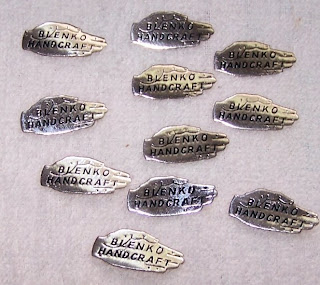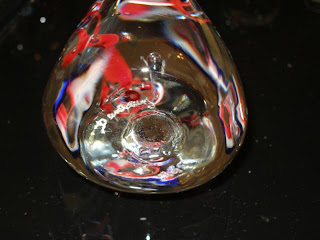Readers: We often speak of the GAS ( Glass Art Society) if you can afford the membership - join. If not try to attend the conference or at least
the art demo and auction. hjhI recommend the Glass Art Society (GAS) http://www.glassart.org/ in part because it is a great way to meet both other glass artists and vendors.
I have had the pleasure not only of purchasing glassblowing tools (both standard tools and molds, and two customized tools)
from John Steinert of Steinert Industries at http://www.steinertindustries.com/ but especially enjoyed meeting John at the GAS Conferences.
It is with that as background that I refer to the excellent write-up about John Steinert from The GAS News, and his Honorary Lifetime Member award.
John Steinert: Honorary Lifetime Member
By Chris Clarke
The name Steinert has become synonymous with quality glass tools and equipment.
Venture into almost any glass studio, private or professional, and you can find
his name. This year’s Honorary Lifetime Membership Award recipient began his
relationship with the glass community in 1977 when he attended his first GAS
conference. By 1978, John Steinert had a booth at the conference Tech Display;
he has been a staple at the conference since that time. His contributions to the
glass community go beyond his tools to the philanthropy he has extended to glass
schools around the country.
Steinert began a machinist apprenticeship shortly after high school and soon
found himself working for the Franklin Machine Company in Kent, Ohio. His
foray into glass tools began when his neighbor, Henry Halem, approached him
around 1976 about making tools for Kent State University. Halem asked Steinert
if he would be able to repair some old pipes the school had. The pipes used by
glassblowers at that time were crude at best, poor quality steel that often flaked
into the glass or bent easily. Could Steinert fabricate a similar product for the school
that would hold up a little longer, Halem wondered. Steinert was given the freedom
at the machine shop to work after hours on his own projects, and he soon set out
to make the blowpipe for Halem. After a few attempts and failures, the technical
issues were resolved and the result was a stainless steel blowpipe with a hardened
tool-steel head that would outlast and outperform anything that was available to
artists at the time.
When Steinert attended his first GAS conference in 1977, he met such artists
as Fritz Driesbach and Dominick Labino. He used their input and the input of many
other artists to develop his line of pipes and punties. The next year, he attended
the GAS conference in Asilomar, California, as a vendor in the Tech Display area;
he not only sold out everything he had brought, he ended up taking many custom
orders. Artists were hungry for quality, affordable tools.
Working 40 hours a week as a machinist for Franklin Machine Company
during the day, Steinert now began working 40 hours a week in the evenings and
weekends on his pipes and punties. Soon, the demand for his tools led him to leave
his day job and form the company we all know today as Steinert Industries.
Officially founded in 1979, Steinert Industries began making pipes, punties,
hand tools, and machines for the studio glass artist. Soon after, its founder developed
a line of metal blow molds that further advanced the decorative techniques
for glassblowers of the time. Simultaneously, he also began to make grinding and
polishing machines for coldworking glass. These machines are responsible for vastly
improving the quality of coldworking in the early Studio Glass Movement.
John Steinert has been a longtime supporter of the Glass Art Society as well
as a number of educational programs across the country. He has supported
these programs with both financial donations as well as donations of tools
and equipment. His generosity to the glass community continues to be exemplified by
his willingness to help artists by providing technical information and developing new
tools to advance glass as an art form.




































